#amazone book
Text
Get Free 1000$ Amazon Gift Card (Giveaway!)2023

This is a brand new giveaway of 1000$ Amazon Gift Card that has just started and you have a great chance of winning it. I recommend you give it a try, you have no downsides.
If you're from United States and want Free 1000$ Amazon Gift Card click on the link down below.
Free 1000$ Amazon Gift Card Giveaway ----> https://tinyurl.com/4sb69662
#amazon gadgets#amazon home#amazon fashion#amazon#amazon books#amazon leather shorts#amazon paintings for sale#amazon music#amazon book#amazon wishlist#amazon wishlist products#amazon wishlists#amazon gift card#amazone book#amazons books#amazon finds#amazon leggings#amazon gift cards#amazon must haves#amazon business#amazon logo products#amazon stuff#amazon products#amazon best products#amazon clothing
5 notes
·
View notes
Text
PSA: *Beware* AI-generated fungi guidebooks!!
…Not a phrase I imagined myself typing today. But, via @heyMAKWA on Twitter:
“i'm not going to link any of them here, for a variety of reasons, but please be aware of what is probably the deadliest AI scam i've ever heard of:
“plant and fungi foraging guide books. the authors are invented, their credentials are invented, and their species IDs will kill you.”
…So PLEASE be careful if you run across anything of this kind.
(ETA: Corrected egregious typo in the title. Apologies, as I was [a] in bed [b] typing hurriedly and one-handed on the iPad, and [c] I think its native keyboard may need recalibration, but also [d] I was upset about what I was having to post, because seriously, WTF?!!)
#WARNING#AI-generated books on amazon#specifically#plant and fungi foraging#guide books#THIS SHIT IS GOING TO GET SOMEBODY KILLED
20K notes
·
View notes
Text
Kickstarting a book to end enshittification, because Amazon will not carry it

My next book is The Internet Con: How to Seize the Means of Computation: it’s a Big Tech disassembly manual that explains how to disenshittify the web and bring back the old good internet. The hardcover comes from Verso on Sept 5, but the audiobook comes from me — because Amazon refuses to sell my audio:
https://www.kickstarter.com/projects/doctorow/the-internet-con-how-to-seize-the-means-of-computation
Amazon owns Audible, the monopoly audiobook platform that controls >90% of the audio market. They require mandatory DRM for every book sold, locking those books forever to Amazon’s monopoly platform. If you break up with Amazon, you have to throw away your entire audiobook library.
That’s a hell of a lot of leverage to hand to any company, let alone a rapacious monopoly that ran a program targeting small publishers called “Project Gazelle,” where execs were ordered to attack indie publishers “the way a cheetah would pursue a sickly gazelle”:
https://www.businessinsider.com/sadistic-amazon-treated-book-sellers-the-way-a-cheetah-would-pursue-a-sickly-gazelle-2013-10
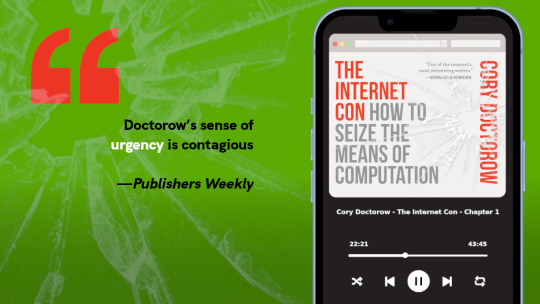
[Image ID: Journalist and novelist Doctorow (Red Team Blues) details a plan for how to break up Big Tech in this impassioned and perceptive manifesto….Doctorow’s sense of urgency is contagious -Publishers Weekly]
I won’t sell my work with DRM, because DRM is key to the enshittification of the internet. Enshittification is why the old, good internet died and became “five giant websites filled with screenshots of the other four” (h/t Tom Eastman). When a tech company can lock in its users and suppliers, it can drain value from both sides, using DRM and other lock-in gimmicks to keep their business even as they grow ever more miserable on the platform.
Here is how platforms die: first, they are good to their users; then they abuse their users to make things better for their business customers; finally, they abuse those business customers to claw back all the value for themselves. Then, they die:
https://pluralistic.net/2023/01/21/potemkin-ai/#hey-guys
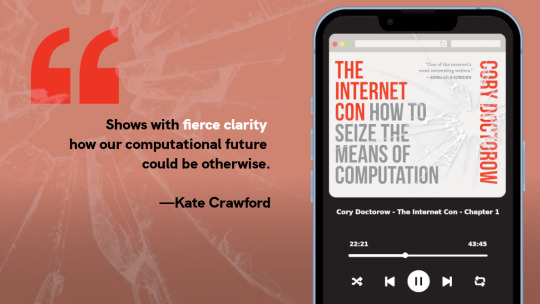
[Image ID: A brilliant barn burner of a book. Cory is one of the sharpest tech critics, and he shows with fierce clarity how our computational future could be otherwise -Kate Crawford, author of The Atlas of AI”]
The Internet Con isn’t just an analysis of where enshittification comes from: it’s a detailed, shovel-ready policy prescription for halting enshittification, throwing it into reverse and bringing back the old, good internet.
How do we do that? With interoperability: the ability to plug new technology into those crapulent, decaying platform. Interop lets you choose which parts of the service you want and block the parts you don’t (think of how an adblocker lets you take the take-it-or-leave “offer” from a website and reply with “How about nah?”):
https://www.eff.org/deeplinks/2019/07/adblocking-how-about-nah
But interop isn’t just about making platforms less terrible — it’s an explosive charge that demolishes walled gardens. With interop, you can leave a social media service, but keep talking to the people who stay. With interop, you can leave your mobile platform, but bring your apps and media with you to a rival’s service. With interop, you can break up with Amazon, and still keep your audiobooks.
So, if interop is so great, why isn’t it everywhere?
Well, it used to be. Interop is how Microsoft became the dominant operating system:
https://www.eff.org/deeplinks/2019/06/adversarial-interoperability-reviving-elegant-weapon-more-civilized-age-slay
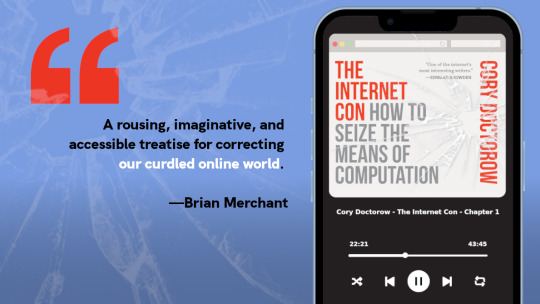
[Image ID: Nobody gets the internet-both the nuts and bolts that make it hum and the laws that shaped it into the mess it is-quite like Cory, and no one’s better qualified to deliver us a user manual for fixing it. That’s The Internet Con: a rousing, imaginative, and accessible treatise for correcting our curdled online world. If you care about the internet, get ready to dedicate yourself to making interoperability a reality. -Brian Merchant, author of Blood in the Machine]
It’s how Apple saved itself from Microsoft’s vicious campaign to destroy it:
https://www.eff.org/deeplinks/2019/06/adversarial-interoperability-reviving-elegant-weapon-more-civilized-age-slay
Every tech giant used interop to grow, and then every tech giant promptly turned around and attacked interoperators. Every pirate wants to be an admiral. When Big Tech did it, that was progress; when you do it back to Big Tech, that’s piracy. The tech giants used their monopoly power to make interop without permission illegal, creating a kind of “felony contempt of business model” (h/t Jay Freeman).
The Internet Con describes how this came to pass, but, more importantly, it tells us how to fix it. It lays out how we can combine different kinds of interop requirements (like the EU’s Digital Markets Act and Massachusetts’s Right to Repair law) with protections for reverse-engineering and other guerrilla tactics to create a system that is strong without being brittle, hard to cheat on and easy to enforce.
What’s more, this book explains how to get these policies: what existing legislative, regulatory and judicial powers can be invoked to make them a reality. Because we are living through the Great Enshittification, and crises erupt every ten seconds, and when those crises occur, the “good ideas lying around” can move from the fringes to the center in an eyeblink:
https://pluralistic.net/2023/06/12/only-a-crisis/#lets-gooooo

[Image ID: Thoughtfully written and patiently presented, The Internet Con explains how the promise of a free and open internet was lost to predatory business practices and the rush to commodify every aspect of our lives. An essential read for anyone that wants to understand how we lost control of our digital spaces and infrastructure to Silicon Valley’s tech giants, and how we can start fighting to get it back. -Tim Maughan, author of INFINITE DETAIL]
After all, we’ve known Big Tech was rotten for years, but we had no idea what to do about it. Every time a Big Tech colossus did something ghastly to millions or billions of people, we tried to fix the tech company. There’s no fixing the tech companies. They need to burn. The way to make users safe from Big Tech predators isn’t to make those predators behave better — it’s to evacuate those users:
https://pluralistic.net/2023/07/18/urban-wildlife-interface/#combustible-walled-gardens
I’ve been campaigning for human rights in the digital world for more than 20 years; I’ve been EFF’s European Director, representing the public interest at the EU, the UN, Westminster, Ottawa and DC. This is the subject I’ve devoted my life to, and I live my principles. I won’t let my books be sold with DRM, which means that Audible won’t carry my audiobooks. My agent tells me that this decision has cost me enough money to pay off my mortgage and put my kid through college. That’s a price I’m willing to pay if it means that my books aren’t enshittification bait.
But not selling on Audible has another cost, one that’s more important to me: a lot of readers prefer audiobooks and 9 out of 10 of those readers start and end their searches on Audible. When they don’t find an author there, they assume no audiobook exists, period. It got so bad I put up an audiobook on Amazon — me, reading an essay, explaining how Audible rips off writers and readers. It’s called “Why None of My Audiobooks Are For Sale on Audible”:
https://pluralistic.net/2022/07/25/can-you-hear-me-now/#acx-ripoff
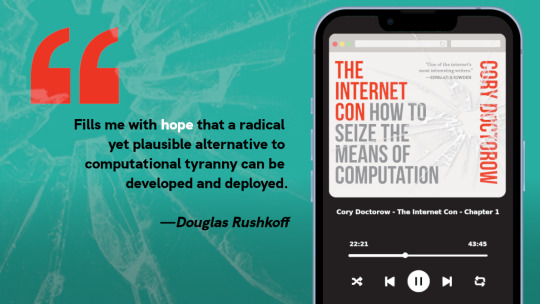
[Image ID: Doctorow has been thinking longer and smarter than anyone else I know about how we create and exchange value in a digital age. -Douglas Rushkoff, author of Present Shock]
To get my audiobooks into readers’ ears, I pre-sell them on Kickstarter. This has been wildly successful, both financially and as a means of getting other prominent authors to break up with Amazon and use crowdfunding to fill the gap. Writers like Brandon Sanderson are doing heroic work, smashing Amazon’s monopoly:
https://www.brandonsanderson.com/guest-editorial-cory-doctorow-is-a-bestselling-author-but-audible-wont-carry-his-audiobooks/
And to be frank, I love audiobooks, too. I swim every day as physio for a chronic pain condition, and I listen to 2–3 books/month on my underwater MP3 player, disappearing into an imaginary world as I scull back and forth in my public pool. I’m able to get those audiobooks on my MP3 player thanks to Libro.fm, a DRM-free store that supports indie booksellers all over the world:
https://blog.libro.fm/a-qa-with-mark-pearson-libro-fm-ceo-and-co-founder/
Producing my own audiobooks has been a dream. Working with Skyboat Media, I’ve gotten narrators like @wilwheaton, Amber Benson, @neil-gaiman and Stefan Rudnicki for my work:
https://craphound.com/shop/

[Image ID: “This book is the instruction manual Big Tech doesn’t want you to read. It deconstructs their crummy products, undemocratic business models, rigged legal regimes, and lies. Crack this book and help build something better. -Astra Taylor, author of Democracy May Not Exist, but We’ll Miss It When Its Gone”]
But for this title, I decided that I would read it myself. After all, I’ve been podcasting since 2006, reading my own work aloud every week or so, even as I traveled the world and gave thousands of speeches about the subject of this book. I was excited (and a little trepedatious) at the prospect, but how could I pass up a chance to work with director Gabrielle de Cuir, who has directed everyone from Anne Hathaway to LeVar Burton to Eric Idle?
Reader, I fucking nailed it. I went back to those daily recordings fully prepared to hate them, but they were good — even great (especially after my engineer John Taylor Williams mastered them). Listen for yourself!
https://archive.org/details/cory_doctorow_internet_con_chapter_01
I hope you’ll consider backing this Kickstarter. If you’ve ever read my free, open access, CC-licensed blog posts and novels, or listened to my podcasts, or come to one of my talks and wished there was a way to say thank you, this is it. These crowdfunders make my DRM-free publishing program viable, even as audiobooks grow more central to a writer’s income and even as a single company takes over nearly the entire audiobook market.
Backers can choose from the DRM-free audiobook, DRM-free ebook (EPUB and MOBI) and a hardcover — including a signed, personalized option, fulfilled through the great LA indie bookstore Book Soup:
https://www.kickstarter.com/projects/doctorow/the-internet-con-how-to-seize-the-means-of-computation
What’s more, these ebooks and audiobooks are unlike any you’ll get anywhere else because they are sold without any terms of service or license agreements. As has been the case since time immemorial, when you buy these books, they’re yours, and you are allowed to do anything with them that copyright law permits — give them away, lend them to friends, or simply read them with any technology you choose.
As with my previous Kickstarters, backers can get their audiobooks delivered with an app (from libro.fm) or as a folder of MP3s. That helps people who struggle with “sideloading,” a process that Apple and Google have made progressively harder, even as they force audiobook and ebook sellers to hand over a 30% app tax on every dollar they make:
https://www.kickstarter.com/projects/doctorow/red-team-blues-another-audiobook-that-amazon-wont-sell/posts/3788112
Enshittification is rotting every layer of the tech stack: mobile, payments, hosting, social, delivery, playback. Every tech company is pulling the rug out from under us, using the chokepoints they built between audiences and speakers, artists and fans, to pick all of our pockets.
The Internet Con isn’t just a lament for the internet we lost — it’s a plan to get it back. I hope you’ll get a copy and share it with the people you love, even as the tech platforms choke off your communities to pad their quarterly numbers.

Next weekend (Aug 4-6), I'll be in Austin for Armadillocon, a science fiction convention, where I'm the Guest of Honor:
https://armadillocon.org/d45/

If you'd like an essay-formatted version of this thread to read or share, here's a link to it on pluralistic.net, my surveillance-free, ad-free, tracker-free blog:
https://pluralistic.net/2023/07/31/seize-the-means-of-computation/#the-internet-con

[Image ID: My forthcoming book 'The Internet Con: How to Seize the Means of Computation' in various editions: Verso hardcover, audiobook displayed on a phone, and ebook displayed on an e-ink reader.]
#pluralistic#trustbusting#big tech#gift guide#kickstarter#the internet con#books#audiobooks#enshitiffication#disenshittification#crowdfunders#seize the means of computation#audible#amazon#verso
15K notes
·
View notes
Text
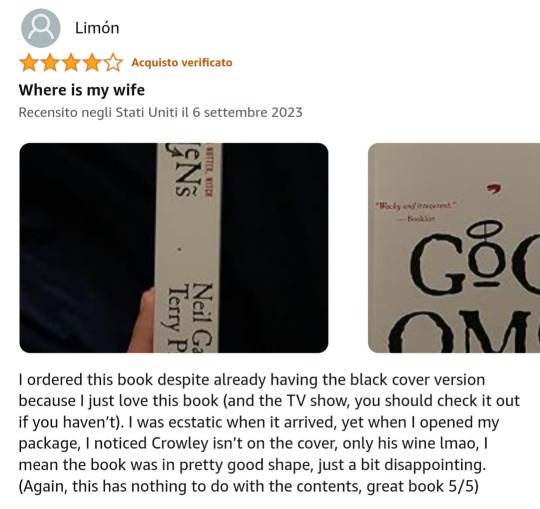
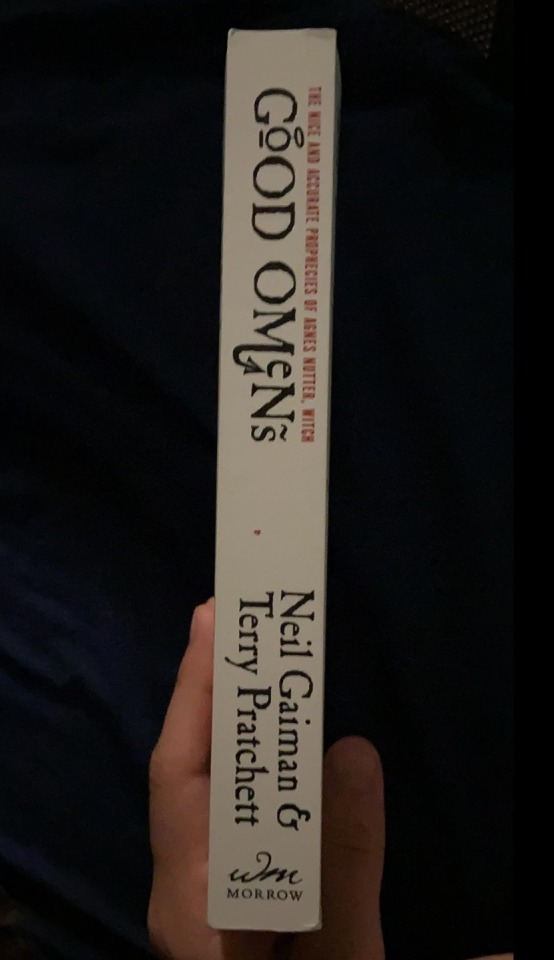

where is my wife
Amazon review on this Morrow edition of "Good Omens" by Neil Gaiman and Terry Pratchett I found this morning that left me laughing in tears right from the title.
... Actually, in hindsight, having seen the ineffable divorce™️ of Season 2, the fact that the only thing left on the cover is his glass of wine makes me so sad. It's like Crowley, having now been through all that, has left his glass of wine in the bookshop and is refusing to come back since Aziraphale is gone. Muriel doesn't really want to touch what Crowley left in the hopes he will be back soon and maybe still want his glass of "whine", whatever that is. He seemed sad last time they saw him, so that's probably what they meant by "whine".
.... Wait a minute though, did Aziraphale write this review?!? "WHERE IS MY WIFE?" ?!?!?
Okay it's time to tag him, this has gone off the rails and so have I. @neil-gaiman please explain. Thank you. (Love your work, actually. But also... What is going on here.)
Update, not even 10 hours after I originally posted this: Neil himself liked the post. I'm freaking out a normal amount about it.

PS: here's a lil thank you post for all the notes I'm getting, holy hell!!!
#WHERE IS MY WIFE#good omens#good omens 2#neil gaiman#terry pratchett#crowley#crowley is my wife#he left his wine of the table#aziraphale#aziracrow#crowley x aziraphale#aziraphale x crowley#on the table in the damn bookshop#aziraphale stop writing amazon book reviews and go see your wife for yourself in person
4K notes
·
View notes
Text
It Ends with Us: A Novel (1) Paperback – Big Book,

0 notes
Text

Middle aged dads emerging as the unforeseen but ultimate powerful force in the streaming wars.
2K notes
·
View notes
Text

#amazon gadgets#amazon home#amazon fashion#amazon#amazon books#amazon leather shorts#amazon paintings for sale#amazon music#amazon book#amazon wishlist#amazon wishlist products#amazon wishlists#amazon gift card#amazone book#amazons books#amazon finds#amazon leggings#amazon gift cards#amazon must haves#amazon business#amazon logo products#amazon stuff#amazon products#amazon best products#amazon clothing
0 notes
Text
a paperback book isnt alive until you break its spine btw like a long slumbering animal being carefully roused it actually needs you to do that like when you click your knuckles. for your paperback book the breaking of its spine is like the first stretch against your pillow in the morning
#have seen people online before say they dont open their paperback books past 45 degree angles so as not to break the spine which is crazy to#me r u afraid someones going to see your books and think they look like youve read them. you are upsetting the book when you dont#break its spine to read all its contents and not even do it that one favour to make the book more comfy youre making it so so sad#also make peace with a book with a broken spine or a bit of wear and tear so that you can start buying books secondhand instead of#off amazon maybe idk#reading tag
3K notes
·
View notes
Text
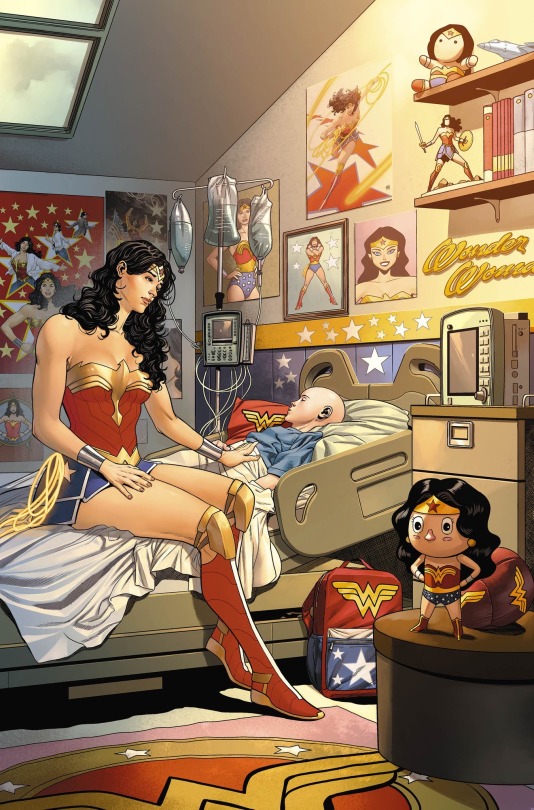
Daniel Sampere
#Wonder Woman#Diana of Themyscira#DC Comics#DC Heroes#Justice League#Comics#Comic Books#Amazons#Super Friends#Themyscira#Paradise Island#Super Heroes#Heroes#Reading#Daniel Sampere
1K notes
·
View notes
Text
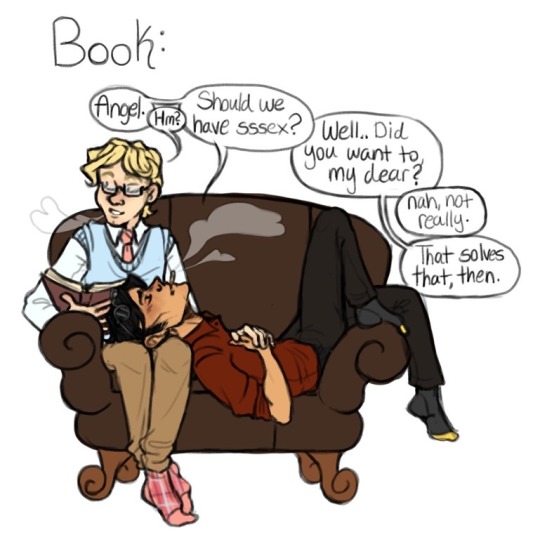

dynamics shift
#good omens#my art#azirowley#azicrow#aziraphale#crowley#ineffable husbands#amazon good omens#good omens book#good omemes#gomens#all headcannons for them are good and valid#this is just my opinion#I love them so much
2K notes
·
View notes
Text



(source, 11/30/22)
KING
#anti rings of power#rings of power#Bernard Hill#LOTR cast#anti rop#and before anyone says something about how Peter Jackson's movies made money too - yes they did#but at least they were based on books Tolkien actually wrote#the Amazon show is not based on any story Tolkien actually wrote#it's just the haphazard and low quality imitation of a greedy and corrupt company#Bernard Hill is right and he should say it#IT'S NOT THE REAL THING#and also#I think he's saying that the Amazon show is PURELY a money-making venture - which is true#the LOTR films were not purely a money-making venture - in fact they didn't even know if they'd be successful at all#and then they were - but no one predicted it
5K notes
·
View notes
Text

Nubia: Queen of the Amazons #4 variant cover by Joelle Jones and Jordie Bellaire
#comic books#dc comics#nubia#amazons#wonder woman#joelle jones#jordie bellaire#variant cover#stephanie williams#alitha martinez#vita ayala
3K notes
·
View notes
Photo
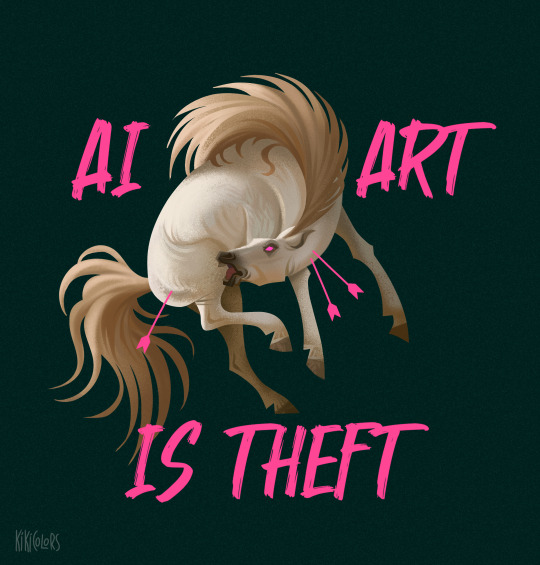
:/
#it makes me furious#especially when they use the my art tag along with ai art#its not ur art its thousands maybe millions of other artists' hard work ur profiting off of and somehow not feeling shame over?#imagine genuinely being proud of that#its completely unregulated and theres no rules#people are using ai art for their childrens books/illustrated novels and selling them on amazon#its so disgusting#i understand doing it for fun but you didnt 'make it' and you shouldn't profit off of it#artists on tumblr#Artists of Tumblr#Illustration#Digital Illustration#digital drawing#animal art#horse#ai art#anti ai art#arrow#arrows#animal portrait#equine#artists#art#digital painting#no to ai art
3K notes
·
View notes
Text

WHICH DARK FEMININE ARCHETYPE ARE YOU?
#succulentsiren#uquiz#dark feminine energy#sirens#witches#gold digger#lilith#goddess#dark feminine#quizzes#marilyn monroe#alexa demie#cindy kimberly#naomi campbell#powerful secrets of the divine feminine#amazon best sellers#books#sayhoneysiren#spiritual books#divine feminine#feminine#archetypes#feminine archetypes#dark feminine archetypes
377 notes
·
View notes
Text
Worth a read!
677 notes
·
View notes
Text
Why none of my books are available on Audible (and why Amazon owes me $3,218.55)

I love audiobooks. When I was a high-school-aged page at a public library in the 1980s, I would pass endless hours shelving and repairing books while listening to “books on tape” from the library’s collection. By the time iTunes came along, I’d amassed a huge collection of cassette and CD audiobooks and I painstakingly ripped them to my collection.
Then came Audible, and I was in heaven — all the audiobooks, none of the hassle of ripping CDs. There was only one problem: the Digital Rights Management (DRM). You see, I’ve spent most of my adult life campaigning against DRM, because I think it’s an existential danger to all computer users — and because it’s a way for tech companies to hijack the relationship between creators and their audiences.
In 2011, I gave a speech at Berlin’s Chaos Communications Congress called “The Coming War on General Purpose Computing.” In it, I explained that Digital Rights Management was technologically incoherent, a bizarre fantasy in which untrusted users of computers could be given encrypted files and all the tools needed to decrypt them, but somehow be prevented from using those decrypted files in ways that conflicted with the preferences of the company that supplied those files.
As I said then, computers are stubbornly, inescapably “general purpose.” The only computer we know how to make — the Turing-complete von Neumann machine — is the computer that can run all the programs we know how to write. When someone claims to have built a computer-powered “appliance” — say, a smart speaker or (God help us all) a smart toaster — that can only run certain programs, what they mean is that they’ve designed a computer that can run every program, but which will refuse to run programs unless the manufacturer approves them.
But this is also technological nonsense. The program that checks to see whether other programs are approved by the manufacturer is also running on an untrusted adversary’s computer (with DRM, you are the manufacturer’s untrusted adversary). Because that overseer program is running on a computer you own, you can replace it, alter it, or subvert it, allowing you to run programs that the manufacturer doesn’t like. That would include (for example) a modified DRM program that unscrambles the manufacturer-supplied video, audio or text file and then, rather than throwing away the unscrambled copy when you’re done with it, saves it so you can open it with a program that doesn’t restrict you from sharing it.
As a technical matter, DRM can’t work. Once one person figures out how to patch a DRM program so that it saves the files it descrambles, they can share that knowledge (or a program they’ve written based on that knowledge) with everyone in the world, instantaneously, at the push of a button. Anyone who has that new program can save unscrambled copies of the files they’ve bought and share those, too.
DRM vendors hand-wave this away, saying things like “this just keeps honest users honest.” As Ed Felten once said, “Keeping honest users honest is like keeping tall users tall.”
In reality, DRM vendors know that technical countermeasures aren’t the bulwark against unauthorized reproduction of their files. They aren’t technology companies at all — they’re legal companies.
In 1998, Bill Clinton signed the Digital Millennium Copyright Act (DMCA) into law. This is a complex law and a decidedly mixed bag, but of all the impacts that the DMCA’s many clauses have had on the world, none have been so quietly, profoundly terrible as Section 1201, the “anti-circumvention” clause that protects DRM.
Under DMCA 1201, it is a felony to “traffick” in tools that bypass DRM. Doing so can land you in prison for five years and hit you with a fine of up to $500,000 (for a first offense). This clause is so broadly written that merely passing on factual information about bugs in a system with DRM can put you in hot water.
Here’s where we get to the existential risk to all computer users part. As a technology, DRM has to run as code that is beyond your observation and control. If there’s a program running on your computer or phone called “DRM” you can delete it, or go into your process manager and force-quit it. No one wants DRM. No one woke up this morning and said, “Dammit, I wish there was a way I could do less with the entertainment files I buy online.” DRM has to hide itself from you, or the first time it gets in your way, you’ll get rid of it.
The proliferation of DRM means that all the commercial operating systems now have a way to run programs that the owners of computers can’t observe or control. Anything that a technologist does to weaken that sneaky, hidden facility risks DMCA 1201 prosecution — and half a decade in prison.
That means that every device with DRM is designed to run programs you can’t see or kill, and no one is allowed to investigate these devices and warn you if they have defects that would allow malicious software to run in that deliberately obscured part of your computer, stealing your data and covertly operating your device’s sensors and actuators. This isn’t just about hacking your camera and microphone: remember, every computerized “appliance” is capable of running every program, which means that your car’s steering and brakes are at risk from malicious software, as are your medical implants and the smart thermostat in your home.
A device that is designed for sneaky code execution and is legally off-limits to independent auditing is bad. A world of those devices — devices we put inside our bodies and put our bodies inside of — is fucking terrifying.
DRM is bad news for our technological future, but it’s also terrible news for our commercial future. Because DMCA 1201 bans trafficking in circumvention devices under any circumstances, manufacturers who design their products with a thin skin of DRM around them can make using those products in the ways you prefer into a literal crime — what Jay Freeman calls “felony contempt of business model.”
The most obvious example of this is in the Right to Repair fight. Devices from tractors and cars to insulin pumps, wheelchairs and ventilators have been redesigned to use DRM to detect and block independent repair, even when the technician uses the manufacturer’s own parts. These devices are booby-trapped so that any “tampering” requires a new authorization code from the manufacturer, which is only given to the manufacturer’s own service technicians.
This allows manufacturers to gouge you on repair and parts, or to simply declare your device to be beyond repair and sell you a new one. Global, monopolistic corporations are drowning the planet in e-waste as a side-effect of their desire to block refurbished devices and parts from cutting into their sales of replacements:.
DRM laws like DMCA 1201 are now all over the world, spread by the US Trade Representative, who made DRM laws a condition of trading with the USA, and a feature of the WTO agreement. Whether you’re in South America, Australia, Europe, Canada, Japan, or even China, DRM-breaking tools are illegal. But remember: DRM is a technological fool’s errand. So while there is no above-ground, legal market for DRM-breaking tools, there is still a thriving underground for them.
For example, farmers all over the world replace the software on their John Deere tractors with software of rumored Ukrainian origin that floats around on the internet. This software lets them fix their tractors without having to wait days for a $200 visit from a John Deere technician, but no one knows what’s in the software, or who made it, or whether it has sneaky back-doors or other malicious code.
And yet, manufacturers keep putting DRM in their products. The prospect of making it a felony to displease your corporate shareholders is just too much to resist.
Which brings me back to Audible. Back before Amazon owned Audible, I bought thousands of dollars’ worth of Audible audiobooks, and they worked great — but they failed badly. When I switched operating systems and could no longer get an Audible playback program, I was in danger of losing my audibook investment. In the end, I had to rig up three old computers to play my Audible audiobooks out in real time and recapture them as plain old MP3s. It took weeks. If I’d made the switch a couple years later, it would have been months (the “audiobooks” folder on my current system has 281 days’ worth of audio!).
Amazon bought Audible during a brief interval in which the company was taking on DRM. They had just launched the Amazon MP3 store, as a rival to Apple’s iTunes Store, which sold music without DRM, so users wouldn’t be locked to Apple’s platform. This was a problem the music industry had just woken up to, after years of demanding DRM, they realized that nearly all the digital music they’d ever sold was locked to Apple’s platform, and that meant that Apple got to decide whether and how their catalog was sold.
Amazon’s MP3 store’s slogan was “DRM: Don’t Restrict Me.” They even sent me a free t-shirt to promote the launch, because they knew my feelings on DRM.
When Amazon announced its Audible acquisition, they promised that they would remove DRM from the Audible store, and I rejoiced. Then, after the acquisition…nothing. Not a word about DRM. The Amazon PR people who’d once enthusiastically pitched me on Amazon’s DRM-free virtue stopped answering my email.
When I got new PR pitches from Amazon, I’d reply by asking about DRM and I’d never hear from those PR people again. I got invited to give a talk at Amazon and I said sure, I’d do it for free — but I wanted to talk to someone from Audible about DRM. The invitation was rescinded.
Once on a book-tour, I gave a talk at Goodreads — another Amazon division — about my work and when they asked if I had any questions for them, I raised Audible’s DRM and the senior managers in the audience promised to look into it. I never heard from them again.
Today, Audible dominates the audiobook market. In some verticals, their market-share is over 90 percent! And Audible will not let authors or publishers opt out of DRM. If you want to publish an audiobook with Audible, you must let them add their DRM to it. That means that every time one of your readers buys one of your books, they’re locking themselves further into Audible. If you sell a million bucks’ worth of audiobooks on Audible, that’s a million bucks your readers have to forfeit to follow you to a rival platform.
As a rightsholder, I can’t authorize my users to strip off Audible’s DRM and switch to a competitor. I can’t even find out which of my readers bought my books from Audible and send them a download code for a free MP3. Even when I invest tens of thousands of dollars of my own money to hire professional narrators to record my audiobooks, if I sell them on Audible, they get the final say in how my readers use the product I paid to create. If I provide my readers with a tool to unwrap Audible’s DRM from my copyrighted books, I become a copyright infringer! I violate Section 1201 of the DMCA and I can go to prison for five years and face a $500,000 fine. For a first offense.
All of this is so glaringly terrible that it prompted me to coin Doctorow’s First Law:
“Any time someone puts a lock on something that belongs to you, but won’t give you the key, that lock is not there for your benefit.”
It’s been more than a decade since Amazon bought Audible and it’s clear that their DRM policy isn’t going anywhere.
Which is why none of my audiobooks are available on Audible.
I don’t want to contribute to the DRM-ification of our devices, turning them into a vast, unauditable attack-surface that is designed to run programs that we can’t see or terminate. I don’t want my work to be a lure into a DRM-poisoned platform. I don’t want to make myself beholden to Amazon, locking my customers to its platform with every sale.
This doesn’t mean I don’t have audiobooks — I do! Early on, I worked with great audiobook publishers like Random House and Blackstone and Macmillan to produce DRM-free audiobooks which were sold everywhere except Audible. But Audible has the vast majority of the market, and it just didn’t make financial sense for these publishers to pay me a decent sum for my audio rights and then pay great narrators and engineers to produce books.
So I started retaining my audio rights in my book deals, and paying to record my own audiobooks. The first one was Information Doesn’t Want to Be Free, recorded by @wilwheaton, with introductions by @neil-gaiman and Amanda Palmer, which explains Doctorow’s First Law in detail.
Since then, I’ve produced many more independent audiobooks, including the audio for Homeland (the bestselling sequel to my YA novel Little Brother, also narrated by Wil), Walkaway (a fabulous multi-cast audiobook starring Amber Benson, Wil Wheaton, Amanda Palmer, Miron Willis, Gabrielle de Cuir and others), and Attack Surface (the third Little Brother book, narrated by Amber Benson).
Generally, these books recoup and make a little money besides, but not nearly so much as I’d make if I sold through Audible. My agent tells me that if I’d been willing to set aside my ethics and allow Audible to slap DRM on my books, I’d have made enough money to pay off my mortgage and save enough to pay for my kid’s entire college education.
That’s a price I’m willing to pay. In the years since the Amazon acquisition, Audible has become the 800-pound gorilla of audiobooks. They have done all kinds of underhanded things — like buying up the first couple books in a series and releasing them as Audible-only recordings, then refusing to record the rest of the series, orphaning it. They’re also notorious among narrators for squeezing their hourly rates lower than anyone else. Audible also refuses to sell into libraries, so all the “Audible Original” titles are blocked from our public library systems.
I think audiences get that there’s something really wrong with a system where a single company controls an entire literary format. In 2020, I Kickstarted the independent audiobook of Attack Surface and broke every record for audiobook crowdfunding, raising $276,000.
But Audible continues to dominate. It is the only digital audiobook channel Amazon will allow, so anyone who searches Amazon for a book will only see the Audible audio edition. It’s also the exclusive audio partner for Apple’s iTunes/Apple Books channel, which is the only iOS audiobook store that doesn’t have to pay Apple a 30 percent commission on all its sales, so it’s the only audiobook store that lets you actually buy new audiobooks.
Other audiobook stores require you to buy your books with a web-browser (which avoids Apple’s sky-high commissions) and then switch back to the app to download them — a clunky experience that has ensured that Apple’s own audiobook channel — with its mandatory DRM — is the only one iOS customers really use.
Not surprisingly, a lot of people assume that if an Audible search for an author or book comes up empty, that means there is no audiobook available. They don’t think of searching for the book on Google Books, or Libro.fm, or Downpour. They never think to check to see whether the author maintains their own storefront, as I do, where you can get all their ebooks and audiobooks without DRM.
That’s bad enough, but it gets worse. So much worse.
Audible has a side-hustle called ACX: it’s a “self-serve” platform where writers and narrators can team up to self-produce their own audiobooks, which are locked to Audible’s platform and encumbered with Audible’s DRM.
ACX has some nominal checks to ensure that the audiobooks that land on its platform are duly licensed from the rightsholders, but these are trivial to circumvent. Here’s how I know that: on multiple occasions, I’ve discovered that my own books have been turned into unauthorized audiobooks over ACX.
Scammers claiming to have the rights to my books commission narrators to record them on the cheap, with the promise of a royalty split when they are live. Inexperienced narrators, excited at the prospect of recording a major book by a bestselling author, put long, grueling hours into recording them. Then the book goes live, and I discover it, and have it taken down. The scammer disappears with the profits from the sales in the interim, and the narrator is screwed.
As am I.
Because these illegal ACX audiobooks compete with my own, self-produced editions, for which I pay narrators, directors and editors a fair wage for their creative labor. These unauthorized ACX audiobooks show up in searches for my name on Audible and Amazon, where my own (vastly superior, authorized) DRM-free audiobooks are not allowed.
This isn’t an isolated incident. It’s happened over and over again. It just happened again.
Last week, I heard from Shawn Hartel, a narrator who got scammed on ACX by someone calling themself “Barbara M. Rushing,” who told Hartel that they held the audio rights to my 2017 novel Walkaway. They do not have those rights.
I spent about $50,000 recording a stupendous audiobook edition of Walkaway, which you can buy here for $24.95.
This audiobook has met with widespread critical acclaim and the print edition has been translated and celebrated around the world. But Hartel didn’t know that.
On January 11, 2021, he accepted an offer from “Barbara M. Rushing” to record the book and worked long hours to produce a 16-hour narration. On February 1, 2021, the book was accepted by Rushing. On July 7, 2021, ACX listed Walkaway for sale. On November 9, 2021, ACX took the book down, having figured out that it was infringing.
In the meantime, Rushing sold 119 copies and gave away ten more, diverting people from buying my own, DRM-free edition.
129 times $24.95 is $3,218.55, and as far as I’m concerned, that’s what Amazon owes me.
Now, I’m not going to sue them (probably). I don’t have the money or time to fight that kind of battle. For one thing, I have eight books (four novels, a YA graphic novel, a short story collection and two nonfiction books) in various stages of production right now, and I’m going to be producing my own audio editions for them, which is going to suck up a lot of time.
But Amazon does owe me $3,218.55.
I don’t expect they’ll pay it.
Anyone who’s paid attention to Audiblegate knows about Amazon’s dirty ACX dealing. The company has been credibly accused of more than $100 million in wage-theft from ACX authors and narrators, whom it has scammed with a combination of a one-sided refunds policy and out-and-out accounting fraud.
I know a lot about Audiblegate because there’s a whole chapter about it in Chokepoint Capitalism: How Big Tech and Big Content Captured Creative Labor Markets and How We’ll Win Them Back, the book on creative labor markets that Rebecca Giblin and I wrote for Beacon Press:
Chokepoint Capitalism explains how large media and tech companies have cornered the markets for creative labor, and why giving creators more copyright won’t unrig this rigged game. The tech and entertainment giants are like bullies at the school gate who shake down creators for their lunch money every day.
To reach your audience you have to go through the chokepoints they have erected, and when you do, any additional copyright powers Congress has granted you is taken away as a condition of entry (think of how Audible nonconsensually takes away your right to use DRM law if you want to list your audiobooks).
If you give your bullied kid more lunch money, you won’t buy them lunch — you’ll just make the bullies at the school-gate richer. Giving creators more copyright inevitably results in those copyrights being transferred to Amazon and other monopolists. To get lunch for your kid — or justice for creators — you have to get rid of the chokepoints.
That’s what Chokepoint Capitalism is really about — not just how the markets got rigged, but how to fix them, with a list of shovel-ready, practical actions for local governments, national legislatures, artists’ groups, as well as creators, technologists and audiences.
We’re going to be rolling out a crowdfunding campaign for the Chokepoint Capitalism audiobook in a couple of weeks (the book comes out in mid-September). We’ve scored an incredible narrator, Stefans Rudnicki, who you may have heard on the Ender’s Game books, Hubris by Michael Isikoff and David Corn, or any of 1,000 other audiobooks. Stefan’s won a Stoker, a Bradbury, dozens of Audies and Earphones, two Grammys, and two Hugos. It’s gonna be fucking great.
And it won’t be available on Audible. Who owe me $3,218.55.
But you know what will*be available on Audible?
This. This essay, which I am about to record as an audiobook, to be mastered by my brilliant sound engineer John Taylor Williams, and will thereafter upload to ACX as a self-published, free audiobook.
Perhaps you aren’t reading these words off your screen. Perhaps you are an Audible customer who searched for my books and only found this odd, short audiobook entitled: “Why none of my books are available on Audible: And why Amazon owes me $3,218.55.”
I send you greetings, fellow audiobook listener!
I invite you to buy all my audiobooks at prices lower than Amazon’s, free from DRM and unencumbered by comedy-of-the-absurd “user agreements” that no one in their right mind would ever*agree to. They are for sale at craphound.com/shop.
Among those audiobooks, the $15 edition of Information Doesn’t Want to Be Free, where I explain not just Doctorow’s First Law, but also my Second and Third Laws (my agent was Arthur C. Clarke’s agent; when I told him I had come up with “Doctorow’s Law,” he told me that I needed three laws). As noted, this is superbly read by Wil Wheaton, and Neil Gaiman and Amanda Palmer read their own intros:
Of course, you will only find this book if Amazon ACX accepts it. I’ve combed quite carefully through their terms of service and I don’t see anything that would disqualify this from being listed as an ACX book.
But then again, they say they ban books produced without permission from the copyright holder and we’ve seen how that works out, right? From poking around on ACX, it looks like Amazon’s main way of checking whether a user has the rights to a book is by looking in Amazon’s catalog to see if there’s already an audiobook edition. That means that if a writer refuses to sell on Audible because of their DRM policies, Audible will use that boycott as an excuse to let ripoff artists bilk the writer, the narrator and the listeners — because if there’s no Audible edition, they assume that the audio rights must be up for grabs.
Will Audible let me use its platform to give away a book that criticizes Audible? Or will they exercise their overwhelming market power to both abet a $3,218.55 ripoff and suppress a critique of their role in that ripoff?
Only time will tell.
#

[Image ID: A screengrab of the ACX page for the audiobook, showing that it is 'pending audio review]
Addendum: I wrote the above on July 4, 2022, just before submitting the audiobook to Amazon and leaving for a holiday. Over the past two weeks, I've checked in with ACX daily, but the audiobook still shows as "Pending Audio Review." ACX advises that this process should take a maximum of ten business days. It's been 15. Perhaps they're very backlogged.
Or maybe they're hoping that if they delay the process long enough, I'll give up.
In the meantime, there is now a Kindle edition of this text:
https://www.amazon.com/dp/B0B5RWTPR7/
I had to put this up, it's a prerequisite for posting the audio to ACX. I hadn't planned on posting it, but since they made me, I did.

[Image ID: A screengrab of the Kindle listing page for my ebook showing it as the number one new release in antitrust.]
Bizarrely, this is currently the number one new Amazon book on Antitrust Law!
Also bizarrely - given the context - this book was taken down for several days due to a spurious copyright issue over the cover art, a cack-handed collage of some Creative Commons icons I put together with The GIMP. Amazon flagged this as a copyright violation (despite correct Creative Commons attribution) and took the book down, demanding that I change the cover art, ignoring my explanations. I was ultimately able to get the book restored by contacting someone I know at Amazon legal, who intervened.
I don't know if Amazon will ever release my audiobook, but I hope they do. In the meantime, you can listen to the audiobook of this essay for free via my podcast:
https://archive.org/download/Cory_Doctorow_Podcast_431/Cory_Doctorow_Podcast_431_-_Why_none_of_my_books_are_available_on_Audible.mp3
#
ETA: Within a few hours of my publishing this thread, ACX released my audiobook. https://audible.com/pd/B0B7KH8KSD
Image: Paris 16 (modified)/CC BY-SA 4.0; Dmitry Baranovskiy (modified) CC BY 4.0
[Image ID: An anti-pickpocketing graphic featuring a stick figure reaching into an adjacent stick-figure's shoulder-bag. The robber's chest is emblazoned with an Amazon 'a' logo. The victim's chest is emblazoned with an icon of a fountain-pen. The robber's face has an Amazon 'smile' logo. The victim's face has an inverted Amazon 'smile' logo (and is thus frowning). Beneath these two figures is a wordmark reading 'Audible: Am Amazon Company.']
#audible#amazon#amazongate#creator economy#ripoffs#drm#digital rights management#audiobooks#books#publishing#writing#monopoly#doctorow's first law#pluralistic
6K notes
·
View notes